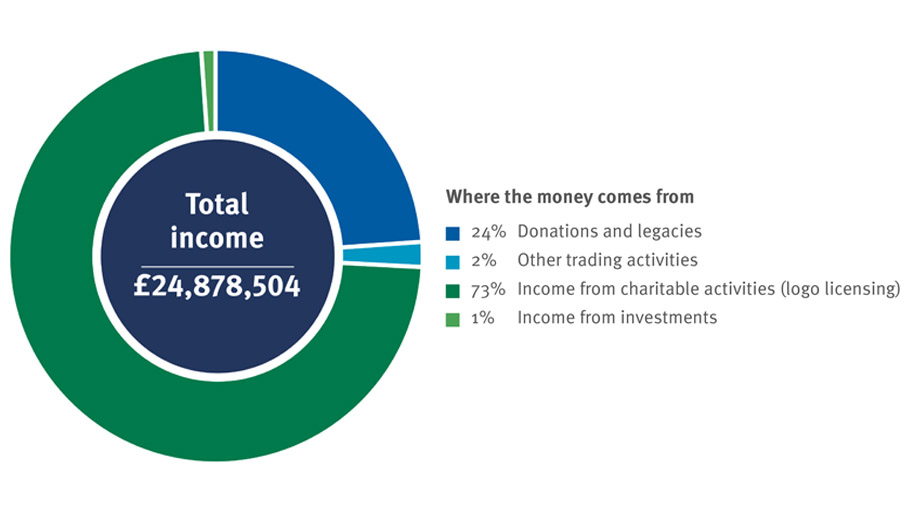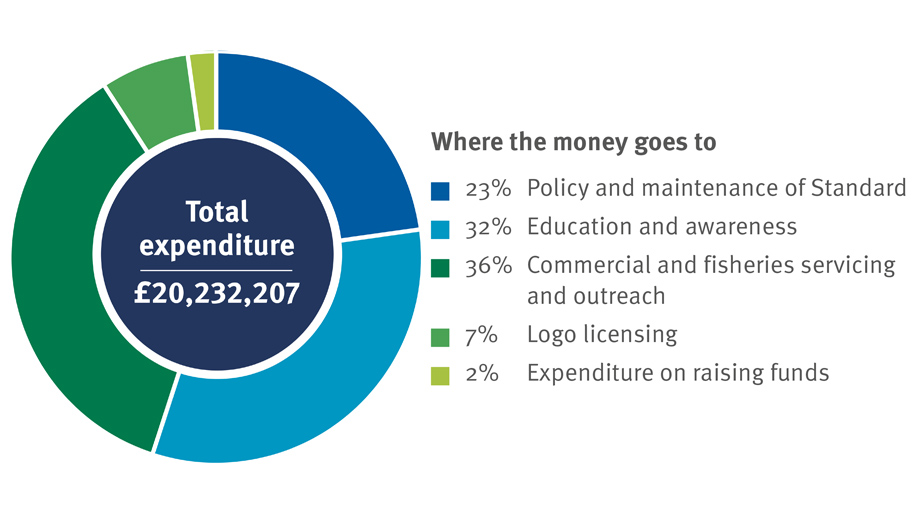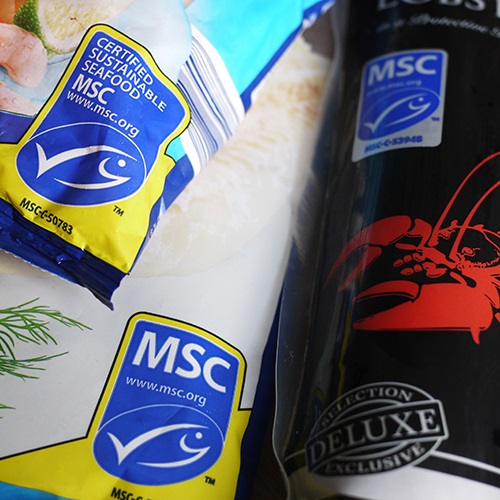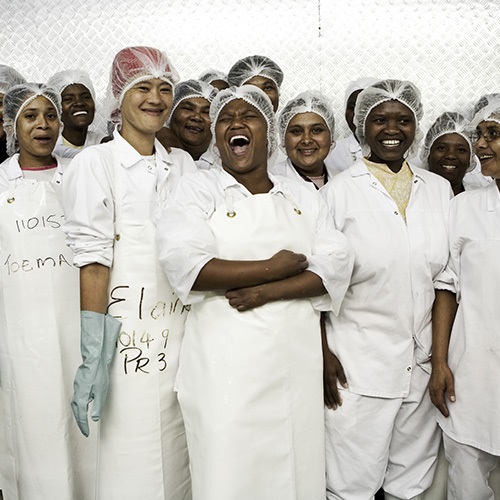As an international non-profit organisation, the MSC is fortunate to benefit from the generous support of donors who share our mission and vision. We also receive funds when our partners choose to use the blue MSC label as a mark of the sustainability of their products.
Our donors
We are extremely grateful for the generous support from our donors. Without their help, we would not be able to achieve our long-term vision of ensuring oceans teeming with life. In addition to providing general operating support, donor funding is supporting our work in the developing world, science and standards development and pathways to sustainability projects.
Our other sources of income
We also generate income through charitable activities and investments.
Most of this funding comes from the logo licensing fee paid by brands, retailers and foodservice organisations which choose to use the MSC blue fish tick label on consumer-facing products. It means that every time a consumer purchases a product showing the MSC blue fish tick label, they’re helping to safeguard oceans and seafood supplies for the future.
This income supports the MSC’s core activities, including our work to educate people about the importance of our oceans, raise awareness of sustainable seafood, ensure the integrity of the MSC certified supply chain, evolve our standards so that they continue to reflect best practice and support research projects, such as those funded through our Global Fisheries Sustainability Fund.
Over the past 20 years, this funding has become increasingly important to the MSC, reflecting growing consumer awareness and demand for products with the blue fish tick.
Ensuring our impartiality
It’s important to note that the MSC receives no income from the assessment or certification of fisheries to its standards. Fees for these services are paid to third party independent, accredited conformity assessment bodies, and are not passed to the MSC. This ensures that the MSC remains impartial in the assessment and certification process, in line with international codes of best practice.
Our income
1 April 2017 to 31 March 2018

How we spend our funds
All funds received and generated through our activities are invested in further delivering our vision of oceans teeming with life and seafood supplies safeguarded for the future. This includes work to maintain world-leading standards, raise awareness of the MSC label, support the seafood industry in their commitments to certified seafood and maintain the integrity of our label.
Our expenditure of overseen by a Board of Trustees made up of representatives from across the science, fishing and retail/brand communities, as well as independent experts. The Board of Trustees ensures that we meet our objectives.
Our expenditure 1 April 2017 to 31 March 2018

Funds in reserve
As a registered charity and non-profit, we hold funds in reserve. This helps to protect us from potential fluctuations in our income and expenditure, including the loss or withdrawal of certified products from the MSC program. We aim to have 9-12 months of unrestricted free reserves to allow us to continue to deliver our vital work while flexing to meet changing circumstances. This is generally understood good practice for non-profit organisations.
Non-profit status
- Australia: ABN 69 517 984 605
- Netherlands: geregistreerde Algemeen Nut Bevorderende Instelling (ANBI)
- Singapore: UEN 201215612M
- UK: Registered charity 1066806
- USA: Non-profit status 501(c)(3)
Our latest audited Group Consolidated Financial Statements and Trustees Report are available upon request to [email protected].
How donations make a difference
Without the generous support from donors, the MSC would not have been able to build and maintain world-leading standards for sustainable fishing, and the positive impacts this delivers.
Our Global Impacts Reports contain examples of the improvements made by fisheries working with the MSC. These improvements are helping to safeguard life in our oceans. They are also securing a future for millions of people dependent upon fishing and seafood for a livelihood. Some of their commitments and the transformations they’ve achieved by working with the MSC are captured in our real-life stories.
Support from our donors will continue to play an essential role in delivering our goal of 20% global marine catch coming from fisheries engaged in the MSC program by 2020.
Projects funded by donations
In addition to unrestricted support, our donors are making a significant difference by funding projects which use tools developed by the MSC. Read about some of these projects below.
Growing a sustainable seafood market in Japan: The David and Lucile Packard Foundation
Japan is an internationally important producer and market for seafood, and has the potential to become a powerful force for global fisheries sustainability. However, awareness and engagement with sustainable fishing has been lower than in other markets.
In 2015, we were fortunate to receive funding from the David and Lucile Packard Foundation to increase our capacity in Japan, focusing on building a sustainable seafood market, supported by major buyers, seafood traders and other NGOs.
We’re already seeing the impact of this funding, with growing commitments from major Japanese retailer, Aeon; work with sustainability advocates; and a new project which will see around 20 fisheries in 4 prefectures undergo pre-assessments to the MSC Standard. We’re working with some of these fisheries to support improvements so that they can enter full MSC assessment, becoming leaders in their sector. This funding was renewed in 2017.
Fish for Good: Dutch Postcode Lottery
Fishermen in the global south will have new opportunities to improve the sustainability of their fishing practices, thanks to funding from the Dutch Postcode Lottery. The four-year project, called ‘Fish for Good’, is working with fishers, communities and local partners to encourage more sustainable fishing in Indonesia, South Africa and Mexico.
The project will be delivered in partnership with local NGOs which provide on-the-ground knowledge, networks and expertise in ocean conservation, helping independent experts to map and benchmark fisheries to the MSC Fisheries Standard. Using this information, fishers will be given access to tools and support to safeguard livelihoods and oceans for future generations.
Project MedFish: Daniel & Nina Carasso Foundation, Resources Legacy Fund and Adessium Foundation
A project to map 100 small scale fisheries in France and Spain has been made possible thanks to the generous support of Daniel & Nina Carasso Foundation, Resources Legacy Fund and Adessium Foundation. Project Medfish, delivered by a partnership between the MSC and WWF is carrying out a rigorous and comprehensive analysis of French and Spanish Mediterranean fisheries, using the MSC Fisheries Standard as a benchmark for sustainability.
Mapping octopus fishing in the Western Indian Ocean: GIZ
German development agency (GIZ), has provided generous support to a new project to map octopus fishing in Madagascar, Kenya, Tanzania, Zanzibar, Mozambique, Rodrigues and Comoros, among others.
The project supported by the MSC, The African Union Interafrican Bureau for Animal Resources (AU-IBAR) and Blue Ventures will bring together government representatives, fisheries managers, provide sector representatives and octopus fishers from across the region.
The MSC Fisheries Standard will be used to benchmark the sustainability of octopus fishing before identifying opportunities to support stakeholder efforts to improve the sustainability of these fisheries.
Our funders
Through the generous support of funders, the MSC has been able to make a real difference in securing a seafood supply for the future. We are very grateful to the organisations and individuals who have given us their support.
Some of our current and recent funders are listed below. Thanks also to those who wish to remain anonymous.
Department for Environment Food & Rural Affairs
Lord Mayor’s Charitable Foundation
National Fish and Wildlife Foundation
The David and Lucile Packard Foundation
Adessium Foundation
Arntz Family Foundation
Bickart Family Fund
Carasso Foundation
Cecil Pilkington Charitable Trust
Certification and Ratings Group / New Ventures Fund
Chapman Charitable Trust
Cohen (John S) Foundation
DEG
Dulverton Trust
Dischma Charitable Trust
Ernest Kleinwort Charitable Trust
European Commission
Fish Society
Findus
Freed Foundation
Garfield Weston Foundation
GEF (Global Environment Facility)
GIZ (Deutsche Gesellschaft für Internationale Zusammenarbeit)
Gladys Wightwick Trust
Golden Bottle Trust
Green Rides
Herbert Hoover Foundation
Holzer Foundation
Hugh Fraser Foundation
ISEAL
Jessie B. Cox Charitable Trust
J G Hogg Charitable Trust
Lady Hind Trust
Marsh Christian Trust
Mary Webb Trust
MAVA
Microsoft Employee Giving
Nessling Foundation
Oakdale Trust
Rainford Trust
Remmer Family Foundation
Rowan Charitable Trust
Scotshill Trust
Sir John Fisher Foundation
Sustainable Fisheries Fund
Swire Charitable Trust
Waterloo Foundation
Support the MSC
Find out how to support our work safeguarding oceans and seafood supplies for the future.
With your continued support, we can secure lasting improvements to marine environments for future generations.
Trusts and foundations
The support of trusts and foundations is critical to delivering our vision of oceans teeming with life, and seafood supplies safeguarded for future generations. We greatly appreciate the generosity of our trust and foundation supporters that share our vision of productive and healthy marine ecosystems.
Whether large or small, towards our core costs or for a specific project, a donation from your trust will enable us to work with fisheries, businesses and the public to bring about a positive change in the way our seas are fished.
As the most credible and globally recognized standard for sustainable fishing, the MSC provides a platform to incentivize real change in the way our oceans are fished. We provide a unique opportunity to influence both fishers and the market by driving consumer demand for sustainable seafood.
Find out more

What does the blue MSC label mean?
The blue fish label is only applied to wild fish or seafood from fisheries that have been certified to the MSC standard, a scientific measure of sustainable fishing.

Real life stories
The best way to understand the impact of the MSC program is through those involved. Read about the passionate people taking care of our oceans.
